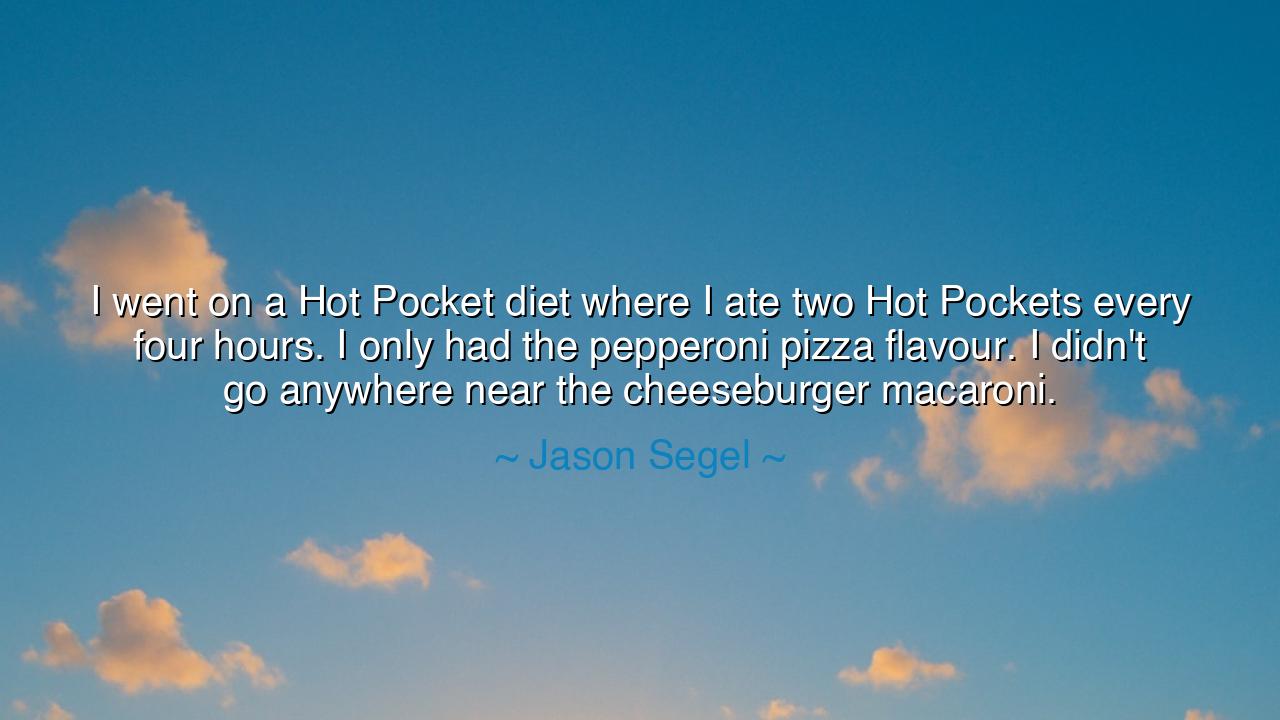
I went on a Hot Pocket diet where I ate two Hot Pockets every
I went on a Hot Pocket diet where I ate two Hot Pockets every four hours. I only had the pepperoni pizza flavour. I didn't go anywhere near the cheeseburger macaroni.






The words of Jason Segel, “I went on a Hot Pocket diet where I ate two Hot Pockets every four hours. I only had the pepperoni pizza flavour. I didn’t go anywhere near the cheeseburger macaroni,” though spoken in jest, conceal a truth of great depth — a truth about discipline, temptation, and the folly of extremes. Beneath the laughter of his tone lies a mirror to our own habits: how easily humanity turns both nourishment and indulgence into obsession. Segel’s humor becomes wisdom when viewed through the ancient lens of balance, for even the gods warned that excess, whether in pleasure or in denial, leads not to harmony but to ruin.
At its surface, this quote may seem like a tale of absurdity — a man choosing to sustain himself on processed pastries filled with molten cheese and pepperoni. Yet, as with all humor that endures, it reveals a reflection of reality. The “Hot Pocket diet” becomes a symbol of our age — an age of convenience, of quick fixes and shallow solutions. In ancient times, philosophers might have told this story as a parable: of a man who sought comfort in the repetition of flavor, mistaking routine for nourishment, and novelty for danger. For what is the cheeseburger macaroni if not the unknown, the temptation beyond one’s self-imposed borders? And what is the pepperoni pizza flavor if not the comfort of the familiar, the illusion of control amid chaos?
Segel’s words echo the eternal struggle between habit and awareness. The ancients of Greece and Rome taught that true strength comes from sophrosyne — moderation, self-mastery, and harmony between body and soul. To eat the same meal every four hours is not just gluttony; it is an act of ritual, a devotion to monotony that reveals a yearning for stability in an unstable world. Yet, as the sages would warn, routine without reflection turns discipline into prison. The man who binds himself to comfort, even with laughter, may one day awaken to find he has lost the taste of freedom.
Consider the story of Emperor Claudius, who was said to have grown addicted to a single dish — a stew of mushrooms so intoxicating he demanded it at every meal. When his enemies sought to kill him, they needed no sword or poison in his cup — only the very mushrooms he loved. Thus, what once gave pleasure became his undoing. This tale, though grim, carries the same truth that Segel’s humorous confession hides within it: that unquestioned indulgence, even in simplicity, can lead to decline. The diet of repetition dulls the senses; the feast without mindfulness feeds the body but starves the soul.
And yet, within Segel’s jest, there is also restraint — for he says, “I didn’t go anywhere near the cheeseburger macaroni.” Here is a man who, even in folly, honors a limit. It is this restraint, humble though it may seem, that redeems the tale. For restraint is the seed of wisdom; it is the whisper of reason amid appetite’s roar. The ancients praised such balance. They saw in moderation not denial, but power — the ability to say “no” to what tempts, and “yes” to what sustains. The pepperoni may be indulgence, but it is contained indulgence; the avoidance of the macaroni, a boundary drawn in jest but rooted in self-knowledge.
From this tale, we learn a lesson that extends beyond the kitchen: that humor itself can be a form of enlightenment. The fool who laughs at his folly often stands closer to wisdom than the sage who scorns it. Segel’s “Hot Pocket diet” is no commandment — it is a mirror, showing us our own habits of excess, our modern rituals of consumption, our longing for control disguised as craving. In his laughter, we find honesty — and in honesty, the path toward awareness.
Let this, then, be the teaching: treat your body as both servant and friend. Feed it with kindness, not indulgence; with balance, not extremes. Avoid the “diet” of the soul — the repetitive patterns that promise comfort but deliver numbness. Taste variety, but not recklessly; enjoy pleasure, but without surrender. And above all, laugh — for laughter disarms the ego and reveals truth without cruelty.
For as Jason Segel reminds us, even a tale of Hot Pockets and self-imposed ritual can reveal the ancient truth: that every act of consumption is a choice between mindlessness and mindfulness, between habit and harmony. Whether one eats from the hearth or from the microwave, the same law governs all — moderation, that golden thread that has guided humanity through ages of hunger and excess alike. So eat, live, and laugh wisely — for it is not the food that defines the man, but the awareness with which he partakes of it.






AAdministratorAdministrator
Welcome, honored guests. Please leave a comment, we will respond soon